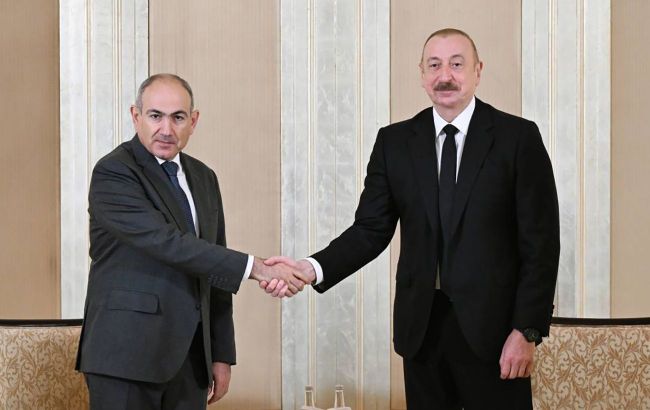Armenia and Azerbaijan sign peace deal as Trump pushes Russia out of Caucasus
 Armenian Prime Minister Nikol Pashinyan and Azerbaijani President Ilham Aliyev (photo: Getty Images)
Armenian Prime Minister Nikol Pashinyan and Azerbaijani President Ilham Aliyev (photo: Getty Images)
Azerbaijan and Armenia will sign a peace agreement today, brokered by the US, which will significantly weaken Russia's influence in the South Caucasus.
RBC-Ukraine explains the essence of the agreement, its possible consequences for both countries and the region as a whole.
Key questions
- Why are Armenia and Azerbaijan making peace after many years of conflict?
- What role did the US play in the negotiations?
- Why will the agreement undermine Russia's influence and strengthen the US position?
Long-standing conflict between Armenia and Azerbaijan
Since the late 1980s, there has been a protracted conflict between Armenia and Azerbaijan over Nagorno-Karabakh, a region in Azerbaijan where the vast majority of the population is Armenian. With the collapse of the USSR, both countries started a war over Nagorno-Karabakh, which Armenia won.
In the war, Azerbaijan received support from Türkiye, which blocked the Armenian borders. As a result, Armenia found itself in international semi-isolation, falling into economic and political dependence on Russia.
Over time, Azerbaijan managed to modernize its army and completely regain control of the lost territories by military means in two rounds — in 2020 and 2023.
Why Yerevan and Baku need agreement
After the final loss of Nagorno-Karabakh, Armenia is seeking reconciliation with Azerbaijan. Due to the conflict, the borders with its two neighbors, Türkiye and Azerbaijan, have remained closed for decades.
Armenia's only links to the outside world were routes through Iran and Georgia. This partial isolation hampered economic development and complicated Armenia's integration into the international community. Peace will allow it to use its geographical position to benefit its economy and attract investment, thereby reducing Russia's influence in Armenia.
For its part, Azerbaijan seeks to finally eliminate all of Armenia's claims to Nagorno-Karabakh. In addition, peace with Armenia will allow for the full development of the Nakhchivan Autonomous Republic, an enclave separated from the main part of Azerbaijan by Armenian territory. Communication between Nakhchivan and the rest of the country is only possible by air or via the Zangezur land corridor.
The US has a multifaceted interest in mediating this situation. On the one hand, Donald Trump has recently been trying to end as many wars as possible, hoping that he will one day be awarded the Nobel Peace Prize for this. On the other hand, US involvement will reduce Russia's influence in the region. In addition, the financial benefits of implementing economic projects in the region should not be forgotten.
Peace agreement
Several documents are planned to be signed in Washington. The first is a framework bilateral agreement directly between Armenia and Azerbaijan. Its full text contains 17 points and is currently confidential. However, some details are known.
The agreement provides for the normalization of interstate relations through mutual recognition of sovereignty and territorial integrity, as well as economic cooperation between Baku and Yerevan.
One of the key elements of the document is the creation of a transit corridor through the aforementioned Zangezur corridor, which will connect the main part of Azerbaijan with its enclave of Nakhchivan.
According to Radio Liberty's Armenian service, the agreement also contains provisions on the waiver of international claims and the non-deployment of third-country troops on the border between Armenia and Azerbaijan.
Other provisions of the agreement, which were previously discussed in the media of both countries, concern the clarification of the border line, the exchange of prisoners, and measures to support refugees and internally displaced persons.
Agreements with US
In addition to the main document, the US will sign bilateral agreements with both countries for the joint use of economic opportunities. The agreements will give the US rights to develop the Zangezur corridor, which will be called the Trump Route for International Peace and Prosperity.
The agreement stipulates that the US will not directly pay for the construction of the transit corridor. Instead, Washington will call on private corporations to invest.
Separately, the leaders of Armenia and Azerbaijan plan to submit an official request to dissolve the OSCE Minsk Group, which was created in 1999 to mediate in the Karabakh conflict and was headed by the US, France, and Russia.
Thus, the reconciliation between Armenia and Azerbaijan could undermine Russia's influence in the South Caucasus while strengthening the position of the US. However, a final resolution of all issues between Baku and Yerevan is still a long way off.
In Azerbaijan, the agreement is seen as a victory, while in Armenia, it is seen as a compromise, and part of Armenian society is strongly opposed to the agreement. Ultimately, Russia will certainly not sit idly by and watch as it is pushed out of the region.
Sources: statements by American, Azerbaijani, and Armenian politicians, Reuters, Vzglyad.az, and the Armenian service of Radio Liberty.

